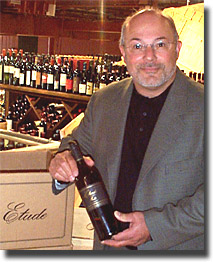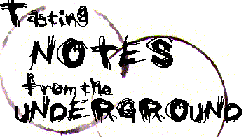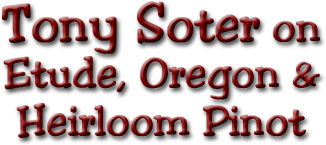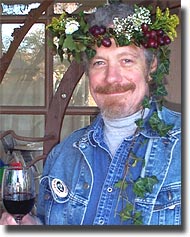|

Part 1 | Part 2
 e get lots of samples here at Gang Central. Sometimes they come
with goofy labels and questionable contents, and sometimes, they're
significant bottles that we might rarely get a chance to try otherwise.
Such was the case a week ago, when I brought home an '01
Etude Heirloom
Pinot Noir, a wine that maintains a lofty position in the pantheon of
Left Coast Pinots. Once in the house, we didn't waste any time pouring
glasses, since we've been fans of Tony Soter's
wines for a long time, and wanted to see what this one's all about.
Here's what we found: e get lots of samples here at Gang Central. Sometimes they come
with goofy labels and questionable contents, and sometimes, they're
significant bottles that we might rarely get a chance to try otherwise.
Such was the case a week ago, when I brought home an '01
Etude Heirloom
Pinot Noir, a wine that maintains a lofty position in the pantheon of
Left Coast Pinots. Once in the house, we didn't waste any time pouring
glasses, since we've been fans of Tony Soter's
wines for a long time, and wanted to see what this one's all about.
Here's what we found:
2001 Etude Carneros Pinot Noir Heirloom, $100, 14.5% alc.: Only
34 barrels of this almost inky colored Pinot Noir were produced; it
shows deep, dark smoky plum and black cherry with a significant overlay
of what seems to be French oak (a quick check on the
Etude website
confirms this) on the otherwise stingy aromatics that need to be
coaxed from the glass with vigorous swirlatude. The big, ripe flavors
pick things up with some serious concentration, formidable structure, a
little earth, a bit of heat and a certain green streak. This is a big,
big wine that needs substantial cellar time; it has the fruit, tannins
and acidity to age for 5 - 10 years, but the heat concerns me. With
extended air, it mellows a bit, but doesn't quite lose the hot quality.
Try it in '09 to see how it's coming along.
Fast forward a few days: I got a call from a simple country wine
retailer, one Bill Schwab, asking
me, in much the same manner that he'd use to inquire whether I wanted
tuna or chicken salad for lunch, if I cared to interview Tony Soter the
following day.
Like he needed to ask...
 Tony
Soter is only one of the most talented and influential winemakers in the
world. After graduating from Pomona College in Claremont,
California, a summer job selling wine steered him in the direction
that his life has taken so successfully. He began as a cellar rat at
Stag's Leap Wine Cellars in 1975, did postgraduate study in
Enology and Viticulture at U.C. Davis, and moved on to
Chappellet, where he took over the position of winemaker in 1977. In
1980, Soter began his business as a consulting winemaker, and over the
years, his clients have included some of the biggest names in Napa
Valley, including Araujo Estate, Dalla Valle, Neibaum-Coppola,
Shafer, Spottswoode and Viader. At about that same
time, he launched his own Etude brand, developing it into a highly
successful producer of Pinot Noir and Cabernet Sauvignon. Tony
Soter is only one of the most talented and influential winemakers in the
world. After graduating from Pomona College in Claremont,
California, a summer job selling wine steered him in the direction
that his life has taken so successfully. He began as a cellar rat at
Stag's Leap Wine Cellars in 1975, did postgraduate study in
Enology and Viticulture at U.C. Davis, and moved on to
Chappellet, where he took over the position of winemaker in 1977. In
1980, Soter began his business as a consulting winemaker, and over the
years, his clients have included some of the biggest names in Napa
Valley, including Araujo Estate, Dalla Valle, Neibaum-Coppola,
Shafer, Spottswoode and Viader. At about that same
time, he launched his own Etude brand, developing it into a highly
successful producer of Pinot Noir and Cabernet Sauvignon.
So yes, I was definitely interested in an interview, and in fact, I had
some ideas for topics that I thought might be interesting to explore.
Arrangements were made, and the next day, I met Mr. Soter, accompanied
by
Decanter Wine Imports' Operations President Michael Kilano,
Beringer Blass District Manager Wendy Sue Johnston and Etude
National Sales Manager Steve Starke at Papa Joe's Gourmet Market
in Birmingham, Michigan. After a quick photo op at a stacked
display of Etude Merlot, we sat down amidst the hustle and bustle of
"Café
Joe" for the following conversation.
GoP: What brings you to Detroit, Etude business, Soter Vineyards business,
or both?
Soter: I'm here because first, it's an opportunity to go to the
Wine Experience in Chicago, starting tomorrow and through the
weekend. It's a big event sponsored by the Wine Spectator, and we'll be
presenting both Soter and Etude wines there, the Etude wines at
the Grand Tasting two nights in a row. There's also a special feature
on Saturday where
Chef Charlie Trotter of Chicago and other chefs
in his group will be offering food and wine pairings. Chef Trotter was
kind enough to select my Soter Vineyards Pinot Noir to be part of his
presentation, so I'll have an opportunity to shepherd both of my wines
in Chicago.
Detroit is a new market for the Soter wines that we've
just assigned the Decanter Wine Company as our distributor, and the
first wines are just coming into the market as we speak. So, it's a
timely opportunity to introduce the Soter wines to the Detroit market,
and say thanks for all the great patronage we've had over the years for
the Etude wines.
GoP: Over the years, you developed Etude into a
highly respected, top - notch producer of Pinot Noir and Cabernet
Sauvignon, among other varietals. Then, in 2001, you sold the brand to
Beringer Blass.
Can you explain how this came about?
Soter: I started the business way back in 1980 as a labor of love, and a
bootstrapping entrepreneurial venture, where I worked my day job as a
consulting enologist to other wineries, which was great creative work,
but also allowed me to develop my own business called Etude, that was
focused around the challenges of making Pinot Noir. Etude, as many
people know, is a French word that means "study," and in classical
music, etudes are compositions that have a technical motive, and I take
that as kind of an analogy to my approach to winemaking. There's no
better vehicle with which to study, if you will, the winemaking craft
than Pinot Noir, because it's reputed to be the most challenging and
difficult, and indeed, it is the most transparent and unforgiving and
quixotic of all varietals, and so one is always humbled by it, even this
many years later. But, when it's right, Pinot Noir is a glorious thing,
and it really takes your breath away, and it's
always in pursuit of that that we work.
"It allowed me not to sell OUT the business, but to sell it UP..."
Now, to your question about the Beringer acquisition; as I grew the
business over the years, I came to a transition in my own awareness of
what it meant to me, and what potential it had, and being a
small company with no particular capital means in Napa, and trying to
grow a business presented certain challenges and hurdles. It became
apparent to me that if I were to grow the business at all, I would have
to either take on partners or take on a huge amount of debt. Private
partners was one alternative, and a partner that could be a strategic
partner, such as a wine company like Beringer Blass, that really
understood the wine business, proved to be a really great opportunity.
It allowed me not to sell OUT the business, but to sell it UP, to a
vision of what I had that I couldn't achieve otherwise.
What I mean by that is that it wouldn't have been possible to afford a
new state - of - the - art winery, which Beringer has provided the
capital to fund and execute, and it wouldn't be possible for me to own
and control our own grape sources, so that I can grow the world's best
Pinot Noirs and make that attempt without that control of the land, and
that resource is also available to me. These things could not have been
achieved otherwise, and I really welcomed the partnership. It doesn't
come without obligation, so I didn't sell out the business, I'm not
moving away or sailing to Hawaii or something like that. I'm there every
day, obligated and motivated, and in fact, quite stimulated to be part
of the development of the business. Designing a winery of your dreams is
a great example, and working with a new vineyard of which you have
complete control is everything a winemaker would dream of and desire in
his attempt to create the best wines he possibly could.
It's a great marriage for me. Beringer has been a most honorable and
supportive new partner to Etude, and they only want us to achieve at
the highest level possible, and to carry the banner of the fine wines
that they represent globally, but really, they're not meddling or trying
to co-mingle things. They want Etude to survive and thrive much as it
has to date, maintaining its fine reputation for Pinot Noir and Cabernet
wines in particular.
GoP: That pretty much answers the next two questions I had regarding
Beringer Blass providing the capital responsible for building the new
winery and you still retaining control at Etude.
Soter: Correct, and beyond the production and winemaking, it extends to
supervision of all the viticulture and grape growing; it also extends to
the commercial side of the business. Etude is actually responsible for
its own wine sales. Now, imagine what a mind - bender that is, because
the Beringer Blass organization has a vast network of sales
representatives throughout the country, and we could take more advantage
of that, but we would be sort of diluting the impact of our sales
message, and we're trying to do it in a very specialized way, only
selling the wines to the best kinds of customers and shops and fine
restaurants around the country, and it takes a specialized point group
of people to do that. So, that's why I travel, and that's why we have
two dedicated salesmen who wake up every day knowing that they only have
one product to promote, and not a whole portfolio, and we have that
luxury like no other brand in the Beringer portfolio. So Steve Starke
and Chris Blanchard are our dedicated sales representatives; one manages
the California market and the other ex - California, across the country.
MORE====>
Part Two of the Tony Soter
Interview
Back to the
Underground
Index
Back to the Top


© George Heritier November 2004
|




 Tony
Soter is only one of the most talented and influential winemakers in the
world. After graduating from Pomona College in Claremont,
California, a summer job selling wine steered him in the direction
that his life has taken so successfully. He began as a cellar rat at
Stag's Leap Wine Cellars in 1975, did postgraduate study in
Enology and Viticulture at U.C. Davis, and moved on to
Chappellet, where he took over the position of winemaker in 1977. In
1980, Soter began his business as a consulting winemaker, and over the
years, his clients have included some of the biggest names in Napa
Valley, including Araujo Estate, Dalla Valle, Neibaum-Coppola,
Shafer, Spottswoode and Viader. At about that same
time, he launched his own Etude brand, developing it into a highly
successful producer of Pinot Noir and Cabernet Sauvignon.
Tony
Soter is only one of the most talented and influential winemakers in the
world. After graduating from Pomona College in Claremont,
California, a summer job selling wine steered him in the direction
that his life has taken so successfully. He began as a cellar rat at
Stag's Leap Wine Cellars in 1975, did postgraduate study in
Enology and Viticulture at U.C. Davis, and moved on to
Chappellet, where he took over the position of winemaker in 1977. In
1980, Soter began his business as a consulting winemaker, and over the
years, his clients have included some of the biggest names in Napa
Valley, including Araujo Estate, Dalla Valle, Neibaum-Coppola,
Shafer, Spottswoode and Viader. At about that same
time, he launched his own Etude brand, developing it into a highly
successful producer of Pinot Noir and Cabernet Sauvignon.